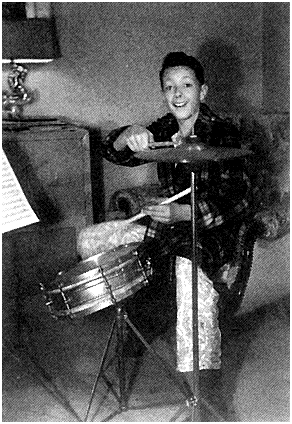State
Tony Cohan
(Broadway)

However, when radio dies, Phil finds little or no work in television. As his famous friends fell away, he spends more time at home with his photo albums, reminiscing about his famous pals. Meanwhile, Tony's mother falls into alcoholism, wrecking cars, disgracing herself in public, hiding gin bottles here and there in the house.
Tony claims to be operating under a curse. An Indian reads his palm, tells him he is going to die young. He meets his hero William Burroughs and is dismayed because Burroughs tries to put the make on him. Bud Powell, another hero, turns out to be a man who has destroyed himself and his music with his drug habit. In Barcelona Memphis Slim tells Cohan that his drumming is not up to snuff: "you in it but you ain't of it." Everywhere, it seems, Cohan keeps getting tangled up with hustlers, paranoiacs and drug dealers. He is sure he is being followed by the drug police through Europe.
At one point, he heads off to Kyoto, gets a job teaching English. What does he remember? How stupid his students: "Insular and self-referential, Japanese tended to be as poor at learning languages as Americans."
Later when he returns to the United States, he lucks on a job accompanying two Indian musicians --- Kuman and Chatterjee --- on their tour through the middle west. What does he remember? "Dismal meals of coleslaw, unfrozen peas, and mashed potatoes."
Tony is operating under a dreadful and unstoppable curse. He is smitten with the complete won't-quit, unrepentant, full-throttle, non-stop, do-or-die complex that psychiatrists refer to technically as the Gloomy Gus Syndrome.
Even after the 30th or 40th repetition of Dad's memories, those dratted photographs, those insensitive, boring, never-ending stories about "Jimmy" and "Dorothy" and "Bing," I slogged through this one, giving up a whole evenings of fun-filled pool-playing with my dissolute buddies. It's good that I kept at it. Because around page 300 or so, it suddenly came to me. With a flash of lightning and a clap of thunder I had an insight --- one that gained me access to the secret heart and soul of Tony Cohan.
It was this: in some masochistic way, Tony had managed to pick up two hefty pieces of baggage left over from his old man.
#1: father and son both have a love for repeating themselves. Tony might have, for example, stuffed all his feelings of gall and wormwood for the old galoot into a single chapter at the beginning and then been done with it. This would have left him free to go on to bigger and better things: like his jazz, his love life, that year of being on the run from Interpol.
#2: Tony is as big a namedropper as the old man. But where the father talked incessantly about Jimmie Durante, Jack Benny, Orson Wells, Dorothy Lamour --- Junior is a one-stop shopper: the famous get a single paragraph, or, at most, a page. Then he totters on to find another famous name to toss in the pot. Thus what Junior loses in quality he makes up for in sheer quantity. He not only pulls in Dexter Gordon, Bud Powell, and Memphis Slim, but, too, Nancy Sinatra (met her in high-school), Richard Fariña (lived down the way in Big Sur), Mimi Fariña (ditto), Joan Baez (ditto), Alan Watts (big drunk), Mike McClure (genuine Beat), Paul Bowles ("good-humoredly indifferent"), Hamza el Din (oud player from Egypt), Ravi Shankar (they did tapes together) Jim Morrison (they did tapes together), Ry Cooder (they did tapes together), and the aforementioned would-be fondler, William Burroughs.
After awhile, this show-off stuff gets to be so omnipresent that when Tony tells us he is listening to "Miles" or to "Dylan," you half-expect him to start in telling of the many nights they spent jamming together.
Tony does have his moments here and there. His record of the decline and fall of Bud Powell is touching. His memories of playing drums and fusing with the other players conveys the excitement of music as well as any I have read. His ever-so-slow seduction of his high-school sweetheart can bring back memories to all of us from the 50s and 60s. But for the most part Native Son is an extended meditation on Tony's supposed curse.
Alas, the curse he imagines --- that he is going to die young --- never pans out. The real curse, that of being a melancholic whiner and a circular, repetitive story-teller. goes on, unfortunately --- on and on (and on).